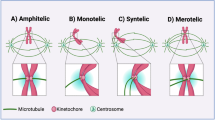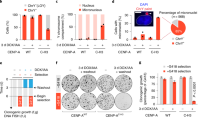Abstract
Eukaryotic cells have multiple chromosomes as carts for the genetic information. In order to ensure faithful reproduction for proliferation in mitosis, or providing an opportunity for genetic reassortment in meiosis, cells must have the ability to deliver their chromosomes properly and in good order to the daughter cells. Chromosome missegregation leads to aneuploidy, the most common genetic aberrations causing birth defects or cancer. During the cell cycle, therefore, the order and timing of dynamic changes in chromosomal morphology and behavior must be tightly controlled to coincide with the cytoskeletal changes that coordinately participate in the processes of genome redistribution.
Preview
Unable to display preview. Download preview PDF.
Similar content being viewed by others
References
Adams RR, Carmena M, Earnshaw WC (2001) Chromosomal passengers and the (aurora) ABCs of mitosis. Trends Cell Biol 11: 49–54
Aono N, Sutani T, Tomonaga T et al. (2002) Cnd2 has dual roles in mitotic condensation and interphase. Nature 417: 197–202
Bernard P, Hardwick K, Javerzat JP (1998) Fission yeast Bubl is a mitotic centromere protein essential for the spindle checkpoint and the preservation of correct ploidy through mitosis. J Cell Biol 143: 1775–1787
Bernard P, Maure JF, Javerzat JP (2001) Fission yeast Bub1 is essential in setting up the meiotic pattern of chromosome segregation. Nat Cell Biol 3: 522–526
Bhat MA, Philp AV, Glover DM, Bellen HJ (1996) Chromatid segregation at anaphase requires the barren product, a novel chromosome-associated protein that interacts with Topoisomerase II. Cell 87: 1103–1114
Birkenbihl RP, Subramani S (1995) The rad21 gene product of Schizosaccharomyces pombe is a nuclear, cell cycle-regulated phosphoprotein. J Biol Chem 270: 7703–7711
Chang L, Morrell JL, Feoktistova A, Gould KL (2001) Study of cyclin proteolysis in anaphase-promoting complex ( APC) mutant cells reveals the requirement for APC function in the final steps of the fission yeast septation initiation network. Mol Cell Biol 21: 66816694
Fesquet D, Fitzpatrick PJ, Johnson AL et al. (1999) A Bub2p-dependent spindle checkpoint pathway regulates the Dbf2p kinase in budding yeast. EMBO J 18: 2424–2434
Funabiki H, Kumada K, Yanagida M (1996a) Fission yeast Cutl and Cut2 are essential for sister chromatid separation, concentrate along the metaphase spindle and form large complexes. EMBO J 15: 6617–6628
Funabiki H, Yamano H, Kumada K et al. (1996b) Cut2 proteolysis required for sister-chromatid separation in fission yeast. Nature 381: 438–441
Funabiki H, Yamano H, Nagao K et al. (1997) Fission yeast Cut2 required for anaphase has two destruction boxes. EMBO J 16: 5977–5987
Furuya K, Takahashi K, Yanagida M (1998) Faithful anaphase is ensured by Mis4, a sister chromatid cohesion molecule required in S phase and not destroyed in GI phase. Genes Dev 12: 3408–3418
Gardner RD, Burke DJ (2000) The spindle checkpoint: two transitions, two pathways. Trends Cell Biol 10: 154–158
Grallert A, Hagan IM (2002) Schizosaccharomyces pombe NIMA-related kinase, Finl, regulates spindle formation and an affinity of Polo for the SPB. EMBO J 21: 3096–3107
Grishchuk EL, Howe JL, McIntosh JR (1998) A screen for genes involved in the anaphase proteolytic pathway identifies tsm1 +, a novel Schizosaccharomyces pombe gene important for microtubule integrity. Genetics 49: 1251–1264
Hartsuiker E, Bähler J, Kohli J (1998) The role of topoisomerase II in meiotic chromosome condensation and segregation in Schizosaccharomyces pombe. Mol Biol Cell 9: 2739–2750
Hartsuiker E, Vaessen E, Carr AM et al. (2001) Fission yeast Rad50 stimulates sister chromatid recombination and links cohesion with repair. EMBO J 20: 6660–6671
He X, Patterson TE, Sazer S (1997) The Schizosaccharomyces pombe spindle checkpoint protein Mad2p blocks anaphase and genetically interacts with the anaphase-promoting complex. Proc Natl Acad Sci USA 94: 7965–7970
He X, Jones MH, Winey M, Sazer S (1998) Mphl, a member of the Mpsl-like family of dual specificity protein kinases, is required for the spindle checkpoint in S. pombe. J Cell Sci 111: 1635–1147
Hirano T (2002) The ABCs of SMC proteins: two-armed ATPases for chromosome condensation, cohesion, and repair. Genes Dev 16: 399–414
Hirano T, Funabashi S, Uemura T, Yanagida M (1986) Isolation and characterization of Schizosaccharomyces pombe cut mutants that block in nuclear division but not cytokinesis. EMBO J 5: 2973–2979
Hogue MT, Ishikawa F (2001) Human chromatid cohesin component hRad21 is phosphorylated in M phase and associated with metaphase centromeres. J Biol Chem 276: 5059–5067
Ikui AE, Furuya K, Yanagida M, Matsumoto T (2002) Control of localization of a spindle checkpoint protein, Mad2, in fission yeast. J Cell Sci 115: 1603–1610
Jallepalli PV, Lengauer C (2001) Chromosome segregation and cancer: cutting through the mystery. Nat Rev Cancer 1: 109–117
Kim SH, Lin DP, Matsumoto S et al. (1998) Fission yeast Slpl: an effector of the Mad2-dependent spindle checkpoint. Science 279: 1045–1047
Kimura K, Hirano T (1997) ATP-dependent positive supercoiling of DNA by 13S condensin: a biochemical implication for chromosome condensation. Cell 90: 625–634
Kominami K, Seth-Smith H, Toda T (1998) Apc10 and Ste9/Srwl, two regulators of the APC-cyclosome, as well as the CDK inhibitor Ruml are required for G1 cell-cycle arrest in fission yeast. EMBO J 17: 5388–5399
Krien MJ, Bugg SI, Palatsides M et al. (1998) A NIMA homologue promotes chromatin condensation in fission yeast. J Cell Sci 111: 967–976
Kumada K, Nakamura T, Nagao K et al. (1998) Cutl is loaded onto the spindle by binding to Cut2 and promotes anaphase spindle movement upon Cut2 proteolysis. Curr Biol 8: 633–641
Leverson JD, Huang HK, Forsburg SL, Hunter T (2002) The Schizosaccharomyces pombe Aurora-related kinase Arkl interacts with the inner centromere protein Picl and mediates chromosome segregation and cytokinesis. Mol Biol Cell 13: 1132–1143
Losada A, Hirano T (2001) Shaping the metaphase chromosome: coordination of cohesion and condensation. Bioessays 23: 924–935
Madril AC, Johnson RE, Washington MT et al. (2001) Fidelity and damage bypass ability of Schizosaccharomyces pombe Eso1 protein, comprised of DNA polymerase 7 and sister chromatid cohesion protein Ctf7. J Biol Chem 276: 42857–42862
Matsusaka T, Imamoto N, Yoneda Yet al. (1998) Mutations in fission yeast Cut15, an impor-tin a homolog, lead to mitotic progression without chromosome condensation. Curr Biol Sep 8: 1031–1034
May KM, Reynolds N, Cullen CF et al. (2002) Polo boxes and Cut23 (Apc8) mediate an interaction between polo kinase and the anaphase-promoting complex for fission yeast mitosis. J Cell Biol 156: 23–28
Millband DN, Hardwick KG (2002) Fission yeast Mad3p is required for Mad2p to inhibit the anaphase-promoting complex and localizes to kinetochores in a Bublp-, Bub3p-, and Mphlp-dependent manner. Mol Cell Biol 22: 2728–2742
Morishita J, Matsusaka T, Goshima G et al. (2001) Birl/Cut17 moving from chromosome to spindle upon the loss of cohesion is required for condensation, spindle elongation and repair. Genes Cells 6: 743–763
Nasmyth K (2001) Disseminating the genome: joining, resolving, and separating sister chromatids during mitosis and meiosis. Annu Rev Genet 35: 673–745
Nonaka N, Kitajima T, Yokobayashi S et al. (2002) Recruitment of cohesin to heterochromatic regions by Swi6/HP1 in fission yeast. Nat Cell Biol 4: 89–93
Peters JM (2002) The anaphase-promoting complex: proteolysis in mitosis and beyond. Mol Cell 9: 931–943
Petersen J, Paris J, Willer M et al. (2001) The S. pombe aurora-related kinase Arkl associates with mitotic structures in a stage dependent manner and is required for chromosome segregation. J Cell Sci 114: 4371–4384
Saka Y, Sutani T, Yamashita Y et al. (1994) Fission yeast Cut3 and Cut14, members of a ubiquitous protein family, are required for chromosome condensation and segregation in mitosis. EMBO J 13: 4938–4952
Sutani T, Yuasa T, Tomonaga T et al. (1999) Fission yeast condensin complex: essential roles of non-SMC subunits for condensation and Cdc2 phosphorylation of Cut3/SMC4. Genes Dev 13: 2271–2283
Takahashi K, Yamada H, Yanagida M (1994) Fission yeast minichromosome loss mutants mis cause lethal aneuploidy and replication abnormality. Mol Biol Cell 5: 1145–1158
Tanaka K, Yonekawa T, Kawasaki Y et al. (2000) Fission yeast Esolp is required for establishing sister chromatid cohesion during S phase. Mol Cell Biol 20: 3459–3469
Tanaka K, Hao Z, Kai M et al. (2001) Establishment and maintenance of sister chromatid cohesion in fission yeast by a unique mechanism. EMBO J 20: 5779–5790
Tang Z, Li B, Bharadwaj R et al. (2001) APC2 Cullin protein and APC11 RING protein comprise the minimal ubiquitin ligase module of the anaphase-promoting complex. Mol Biol Cell 12: 3839–3851
Tatebe H, Yanagida M (2000) Cut8, essential for anaphase, controls localization of 26S proteasome, facilitating destruction of cyclin and Cut2. Curr Biol 10: 1329–1338
Tomonaga T, Nagao K, Kawasaki Y et al. (2000) Characterization of fission yeast cohesin: essential anaphase proteolysis of Rad21 phosphorylated in the S phase. Genes Dev 14: 2757–2770
Toyoda Y, Furuya K, Goshima G et al. (2002) Requirement of chromatid cohesion proteins Rad21/Sccl and Mis4/Scc2 for normal spindle-kinetochore interaction in fission yeast. Curr Biol 12: 347–358
Uemura T, Yanagida M (1984) Isolation of type I and II DNA topoisomerase mutants from fission yeast: single and double mutants show different phenotypes in cell growth and chromatin organization. EMBO J 3: 1737–1744
Uemura T, Ohkura H, Adachi Y et al. (1987) DNA topoisomerase II is required for condensation and separation of mitotic chromosomes in S. pombe. Cell 50: 917–925
Uren AG, Beilharz T, O’Connell MJ et al. (1999) Role for yeast inhibitor of apoptosis ( IAP) like proteins in cell division. Proc Natl Acad Sci USA 96: 10170–10175
Wang SW, Read RL, Norbury CJ (2002) Fission yeast Pds5 is required for accurate chromosome segregation and for survival after DNA damage or metaphase arrest. J Cell Sci 115: 587–598
Watanabe Y, Nurse P (1999) Cohesin Rec8 is required for reductional chromosome segregation at meiosis. Nature 400: 461–464
Watanabe Y, Yokobayashi S, Yamamoto M, Nurse P (2001) Pre-meiotic S phase is linked to reductional chromosome segregation and recombination. Nature 409: 359–363
Yamada H, Kumada K, Yanagida M (1997) Distinct subunit functions and cell cycle regulated phosphorylation of 20S APC/cyclosome required for anaphase in fission yeast. J Cell Sci 110: 1793–1804
Yamashita YM, Nakaseko Y, Samejima I et al. (1996) 20S cyclosome complex formation and proteolytic activity inhibited by the cAMP/PKA pathway. Nature 384: 276–279
Yamashita YM, Nakaseko Y, Kumada K et al. (1999) Fission yeast APC/cyclosome subunits, Cut20/Apc4 and Cut23/Apc8, in regulating metaphase-anaphase progression and cellular stress responses. Genes Cells 4: 445–463
Yanagida M (1998) Fission yeast cut mutations revisited: control of anaphase. Trends Cell Biol 8: 144–149
Yanagida M (2000) Cell cycle mechanisms of sister chromatid separation; roles of Cutl/ separin and Cut2/securin. Genes Cells 5: 1–8
Yanagida M, Yamashita YM, Tatebe H et al. (1999) Control of metaphase-anaphase progression by proteolysis: cyclosome function regulated by the protein kinase A pathway, ubiquitination and localization. Philos Trans R Soc Lond B Biol Sci 354: 1559–1570
Yoon HJ, Feoktistova A, Wolfe BA et al. (2002) Proteomics analysis identifies new components of the fission and budding yeast anaphase-promoting complexes. Curr Biol 12: 2048–2054
Yoshimura SH, Hizume K, Murakami A et al. (2002) Condensin architecture and interaction with DNA. Regulatory non-SMC subunits bind to the head of SMC heterodimer. Curr Biol 12: 508–513
Zou H, McGarry TJ, Bernal T et al. (1999) Identification of a vertebrate sister-chromatid separation inhibitor involved in transformation and tumorigenesis. Science 285: 418–422
Editor information
Editors and Affiliations
Rights and permissions
Copyright information
© 2004 Springer-Verlag Berlin Heidelberg
About this chapter
Cite this chapter
Takahashi, K., Yanagida, M. (2004). Chromosome Cohesion and Segregation. In: Egel, R. (eds) The Molecular Biology of Schizosaccharomyces pombe . Springer, Berlin, Heidelberg. https://doi.org/10.1007/978-3-662-10360-9_11
Download citation
DOI: https://doi.org/10.1007/978-3-662-10360-9_11
Publisher Name: Springer, Berlin, Heidelberg
Print ISBN: 978-3-642-05631-4
Online ISBN: 978-3-662-10360-9
eBook Packages: Springer Book Archive




